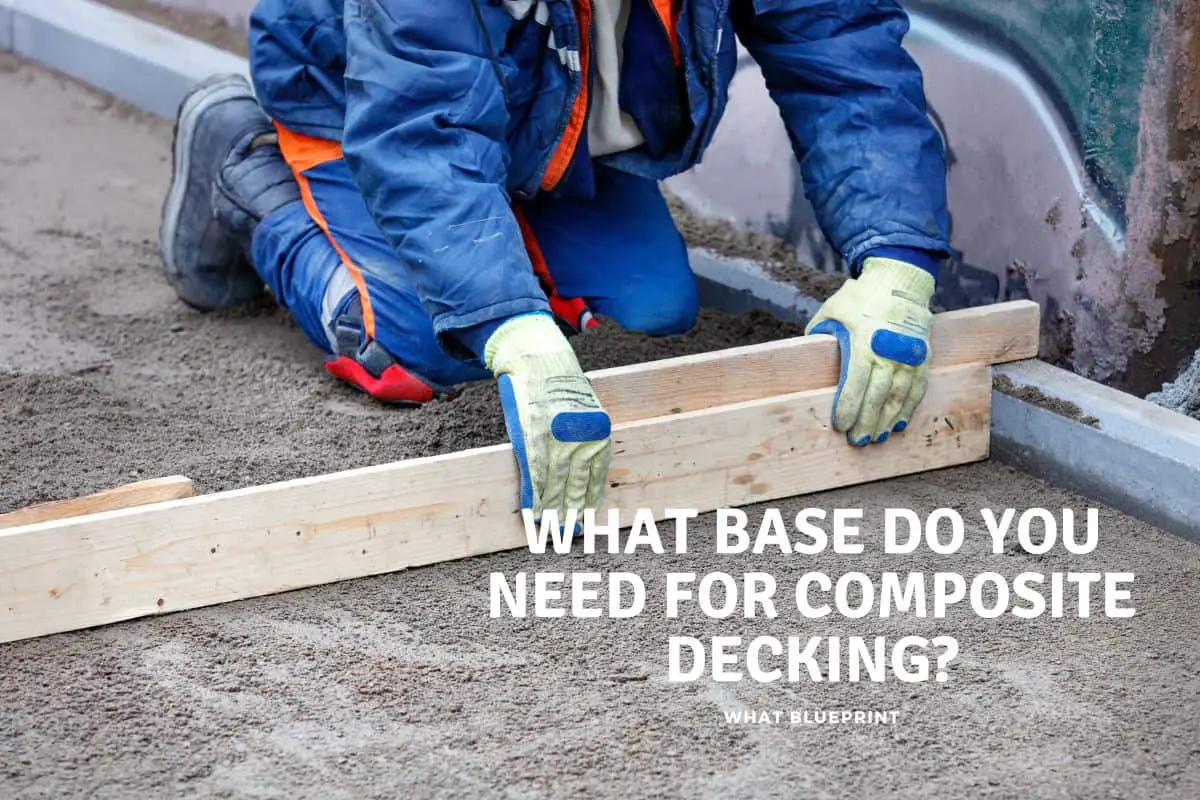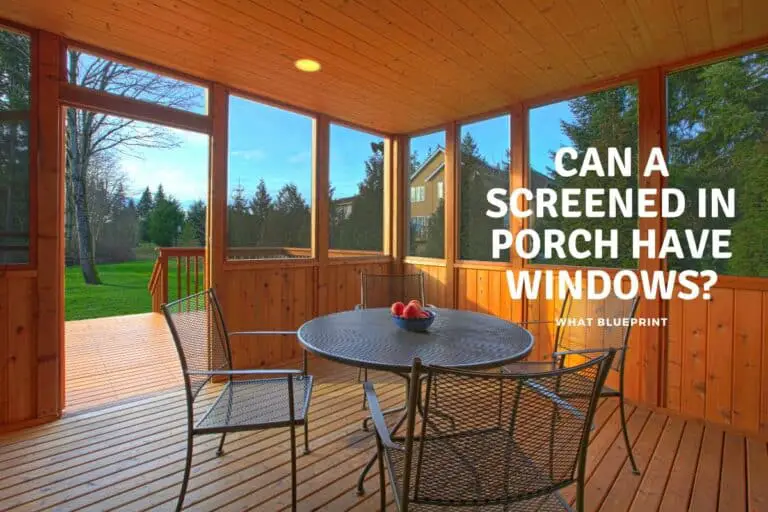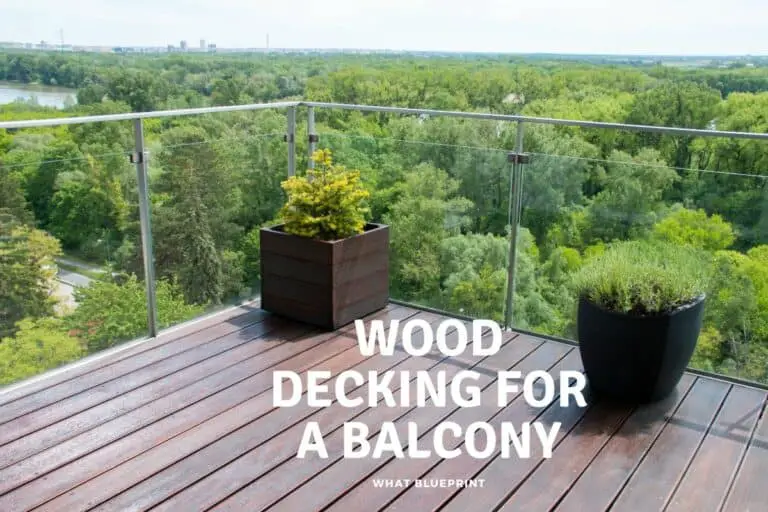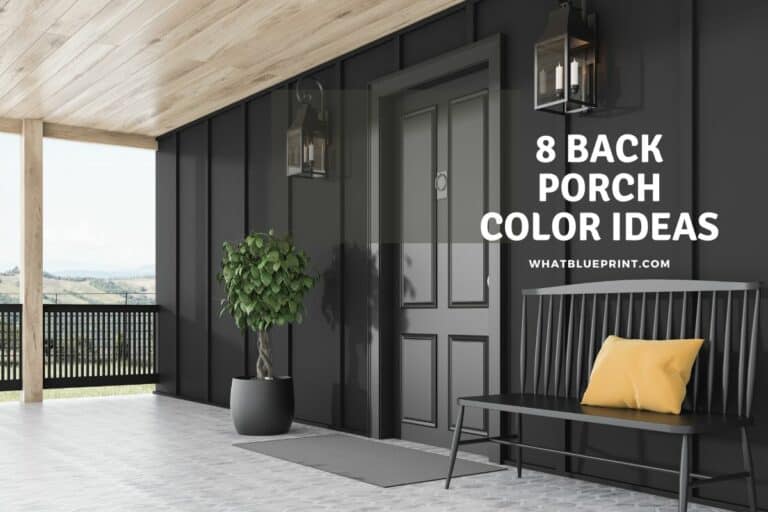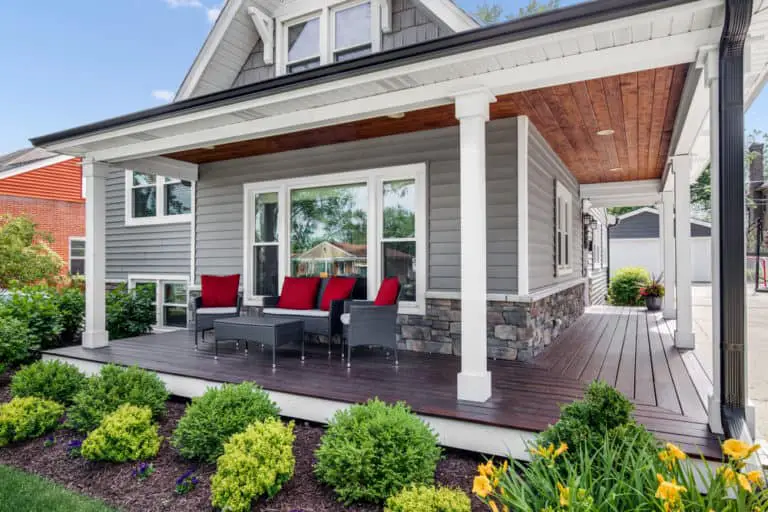What Base Do You Need For Composite Decking?
If you have decided to install a composite deck in your backyard, you might be wondering what base you will need to install your decking on. Proper ground preparation is extremely important as it will determine how long your composite decking lasts and how stable it is. I had to contact a decking company as I had no idea what base you need for composite decking.
Ground preparation is very important for decking as the foundation/base is what your decking will rest on. The most common base for composite decking is a concrete slab, pavers, or bricks. Other people prefer using the composite framework (composite joists) or pressure-treated lumber.
I battled to choose the best base for my composite deck as I had never installed a deck before, and I wanted a base that would be the most durable, safest, and structurally sound. To get the advice, I spoke to decking manufacturers and installers and wanted to share the most helpful information I gathered.
What Base Do You Need For Composite Decking?
Installing a deck in your backyard is a great way to freshen up your yard and home’s overall appearance, and it helps you add value to your home. There is nothing quite like having a deck to sit on while enjoying time with your family.
But before you jump up and start laying down the decking, you need to prepare the ground and add a base or foundation for your composite decking. Experts don’t recommend installing a composite deck on grass or directly over dirt.
You can choose from four different decking bases or foundations, including:
- A compacted concrete slab base
- A concrete or brick paver base
- A pressure-treated wood framework base
- A composite framework base
In the section below, we will go into further detail about these bases with pros and cons that work well for composite decking.
Installing A Concrete Base For Composite Decking
The best option is a concrete base if you want to install a strong and durable base for your decking. Laying a concrete decking base takes more time as you have extensive ground preparation, but it will help your composite decking last much longer. A concrete base works fantastic for composite decking tiles, decking planks, and even the newer PVC (plastic) decking boards.
Pros To Installing A Concrete Base For Composite Decking
Before choosing the composite decking base best suited for you, it’s important to know more about the benefits and drawbacks of concrete as a base.
It’s A Durable Foundation
Concrete slabs work well as bases for composite decking because the ground underneath the base is compacted, so there won’t be ground movement. It also ensures an even surface without needing to compensate for slanting ground. The concrete is durable and long-lasting.
It Has Resistant Features
Using a concrete slab as a base means you will benefit from the heat-resistant properties concrete has; it also can’t rot like a wooden framework, and you won’t need to worry about insect infestation. Mold might attach to the rough surface, but the mold can’t damage the concrete, and it’s easy to clean it off.
Installing Composite Decking Over Concrete Is Easy
One of the best pros to installing composite decking over concrete is that it’s easy to install. It also cuts down on the installation time because you don’t have to build a framework or prepare the ground.
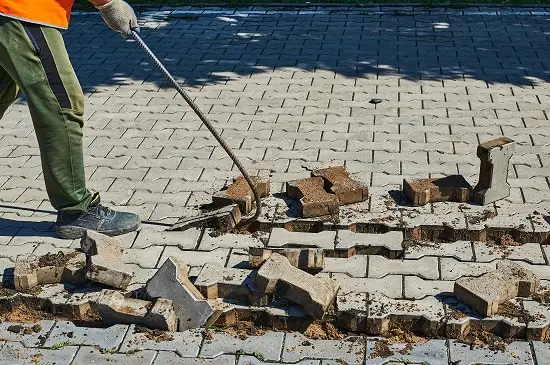
You Can Use Old Patios
If you have an old patio, you can refresh it by using it as a base for your composite decking. You save money as you won’t need to install a base. The composite decking also adds value to your home, so using an old concrete patio as a base will be a great ROI project.
You Have Many Choices
Concrete works as a base for all types of composite decking. You can install wood decking, PVC, vinyl, or regular composite decking over a concrete base. Concrete doesn’t have any special requirements.
Concrete Is Absorbant
Concrete is porous, meaning it absorbs the water. So you will have a dry surface base for your decking. It will help the decking last longer as the concrete is drier than a base of grass or dirt (not recommended by experts).
Cons To Installing A Concrete Base For Composite Decking
Knowing the ins and outs of all your different options is important, so here are the cons to using a concrete base for your composite decking.
Concrete Can Attract Mold
The concrete can have rough patches where mold can grow in rainy seasons, so you may need to regularly use a pressure washer to the base where the mold has grown.
Local Building Codes And Regulations
Before installing the composite decking on a concrete base, you need to check the requirements with your local authorities, as some might have regulations concerning concrete as a base. Most decks are attached to the home and thus need to adhere to certain regulations and building codes.
Incorrectly Poured Concrete Creates Stability Issues
If the concrete base was poured incorrectly, the ground preparation was not done correctly, or your base was not poured thick enough, the concrete can crumble or break.
The deck’s weight might cause the concrete to crack and become unstable, or the concrete slab might sink into the improperly prepared ground and compromise the deck’s structural integrity.
we have a series of article on composite decking to help you chose both materials and designs when you are planning your deck. You can access them from the list below.
Installing Pavers Or Bricks As A Base For Composite Decking
When you don’t have a concrete base or don’t want to use concrete for your decking, you can look into using pavers or bricks as a base. Pavers and bricks make great bases for composite decking. If you have a paved patio but want to install a deck, you don’t have to rip out the pavers; you can save time and money by using them as a base for your composite decking.
Pros To Using Pavers As A Base For Composite Decking
Using pavers as a base for your composite decking is a great idea. Here are some of the added benefits of using them as a base.
Your Composite Deck Will Install Easier
With pavers as the base for your composite decking, you won’t need to worry about how much time and labor it usually takes to install a deck, as this time is drastically cut if you don’t need to install a base or pour concrete. It will also install easier as pavers make a sturdy base.
Pavers And Bricks Are Durable
Using pavers and bricks as a base for your composite decking means you have a strong and durable foundation that improves your deck’s structural integrity. Pavers and bricks have a long life span, and your base will last as long as the deck (between 25-30 years) with proper maintenance.
Pavers And Bricks Have Resistant Properties
When you need a long-lasting base, pavers and bricks are some of the best. They don’t rot or attract insects, and they are waterproof. They are highly resistant to heat and fire, and you don’t need to worry about sealing your pavers or bricks as they can handle extreme weather well.
Cons To Using Pavers As A Base For Composite Decking
While pavers and bricks are great bases for composite decking, there are a few cons you need to consider.
They Can Lift
If your pavers or brick base was not installed correctly or the ground underneath was not properly prepared, your pavers might start to lift and shift over time. For example, if the ground beneath your base regularly moves, it is a bad site to install the pavers and thus the deck.
The ground beneath the pavers was not properly compressed, and the ground shifted in bad weather. These scenarios can lift your pavers or bricks and compromise your deck’s structural integrity.
Wood Framework As A Base For Composite Decking
The next base you can use for composite decking is a pressure-treated wood framework. These are frameworks that you install just before your decking. Remember that the wood is a framework, so it’s not a solid base like concrete or pavers.
When you use wood as a base for your composite decking is usually used on additional wood decks, but it has become more popular in the last few years because some types of wood are much more affordable options.
Pressure-treated wood is the most common wood framework people use as a base for their deck. Remember that you need to use treated lumber as normal lumber would rot or break away in no time. Pressure-treated lumber has been treated to withstand the harsh elements it will be exposed to, like the heat, the cold, rain, insects, and mildew.
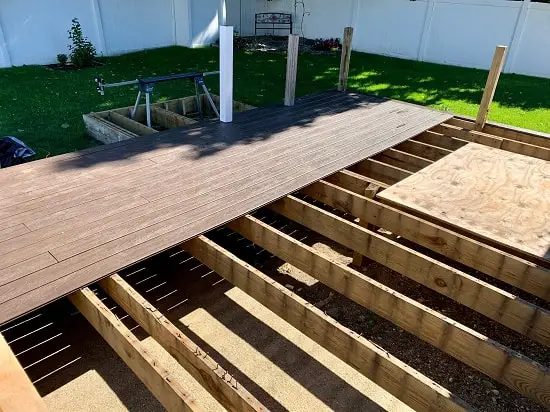
The Pros Of Using Wood Framework
Here are some pros to using the wood framework as a base for your composite decking.
Pressure-Treated Wood Is Less Expensive
While concrete and pavers are great bases for your composite decking, they have their own problems, with one being they cost more to install than a subframe. Pressure-treated wood is the most affordable wood you can use as a framework for your deck.
Hardwood Frames Last Longer
If you use hardwood lumber for your composite framework can last longer than the less expensive wood, sand, or grass. If properly maintained, your hardwood frame can last 15-20 years.
Hardwood Has Naturally Resistant Properties
Hardwood is naturally resistant to wood rot, mold, and insect infestation as they are denser, and woods like teak wood is covered in a natural oil that helps protect it against these issues and has the added benefit of being more water-resistant than softwood.
The Cons Of Using Wood Framework
When using wood, a few cons might influence what base you choose, so it’s best to keep them in mind.
Most Types Of Wood Don’t Last
Despite hardwood that lasts longer than softwood, most wood will not last long as they are typically susceptible to wood rot, insect infestation, damage due to the elements, and mold. Most people use pressure-treated wood to prevent this, as stated before, but that only buys you a small window of extra time.
The Overall Cost Will Be More
While the initial cost of using a wooden framework will cost much less than the other types of bases, the overall cost of maintenance and repairs is higher. You will need to remove and replace the rotten and damaged pieces of wood, and if you seal the wood, you will need to reseal the frame at least twice a year.
Composite Joists As A Base For Composite Decking
Composite joists are a part of the framework you get if you don’t have a base when installing your deck. Experts recommend not using the composite joist as a base for any other kind of decking but composite decking.
Pros Of Using Composite Joists As A Base
When you use composite joists as a base for composite decking, it’s important to know their benefits.
They Are Made Especially For Composite Decking
Composite joists are made for composite decking, which goes hand in hand. They are made to withstand the weight of the decking and exposure to the elements. They are water-resistant and heat-resistant, and they won’t rot with time or get infested with insects.
Composite Joists Have A Long Lifespan
When you use these joists, they will last as long as the composite decking. They are made to last for at least 30 years. They are strong and durable and need less maintenance to them in good condition.
Cons Of Using Composite Joists As Base For Composite Deck
While there are not a lot of cons to using composite joists, there are a few worth noting.
The Initial Cost
The initial cost of using a composite joist will be more than if you use pressure-treated wood, but considering the overall cost is a better deal.
You Need To Hire Professionals To Install Them
Because there are rules and regulations concerning decks, some building codes stipulate that a licensed contractor must install the base of a deck. The other issue is if you don’t hire professionals to install the composite base and the composite decking, it might void the warranty that decking companies give on their products.
We have loads of other deck advice on the site and have listed some below. If the information you need is not listed try a search as new content is added by the day!
- What base do you need for composite decking
- how to seal the ends of deck boards
- Decking options other than wood
- best pressurized treated wood for decks
- composite Deck skirting ideas
- UV protection for Composite decking
- How much Ventilation does a deck need
- How to put skirting on a deck
- Inexpensive deck skirting ideas
- best composite decking
Conclusion
Installing the right base for your composite decking is very important as that will determine how long the structure will last.
You can choose between a solid concrete base, paver or brick base, wooden base, and composite joist base. Your base depends on what works best for your needs and suits your pocket.
References
- https://home.howstuffworks.com/home-improvement/construction/green/composite-decking.htm
- https://www.youtube.com/watch?v=EWauOzTscQ4
- https://www.google.com/search?q=what+base+is+needed+for+a+composite+decking&rlz=1C1CHBF_enZA997ZA997&sxsrf=ALiCzsYIjU9Ay0xqHH3NL7qqjqy4iJfwgw:1655977561912&ei=WTa0YomYN9iBhbIPuN604As&start=20&sa=N&ved=2ahUKEwjJqNWSpcP4AhXYQEEAHTgvDbw4ChDy0wN6BAgCEDs&biw=1536&bih=746&dpr=1.25ps://ecodek.co.uk/how-to-prepare-your-ground-for-decking/
- https://www.youtube.com/watch?v=D_ajX8AAIds

